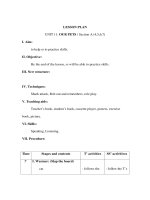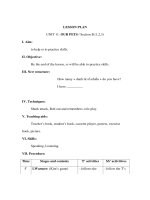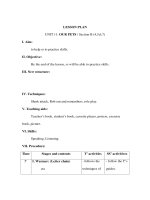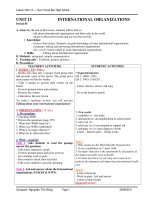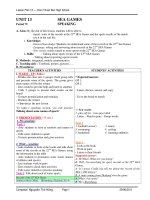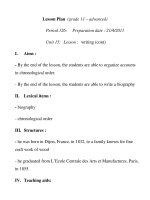LESSON PLAN 10-UNIT 11
Bạn đang xem bản rút gọn của tài liệu. Xem và tải ngay bản đầy đủ của tài liệu tại đây (111.49 KB, 13 trang )
THPT AN LẠC QUỲNH NHƯ
Unit 11: NATIONAL PARKS
Part 1: READING
I. AIMS OF THE LESSON :
1. Teaching aims:
- Help students have some knowledge of national parks in the world, their features
and usefullness.
- Help students have awareness of protecting national parks in their country and
in the world.
2. Language skills :
- Reading and guessing word meanings in context.
- Intensive reading for answering the questions.
- Summarizing the text.
3. Language focus :
• Pronunciation : /d/ - /t/
• Vocabulary : Words related to the topic “National parks” :
- animals & plants : butterflies, animals, orphanage, species…
- directions: northward, southward, through, across, eastern end…
- quality: expensive, dangerous, comfortable,…
• Grammar :
- Conditional sentence type 3.
II. TEACHING AIDS : cassette player, chalks, pictures, handouts, charts , real objects
III. PROCEDURE :
Stages Teacher’s activities Students’ activities Notes
Warmer
(3’)
-Show some pictures and ask :
1. What can you see in these
pictures?
2. Where can they co-exist (or
live together)? In the mountain or
in the national park?
- Correct sts mistakes and then
introduce new lesson.
-Look at these pictures and answer:
1. We can see trees, plants, animals,
mountains, caves.
2. They co-exist in the national park.
pairs
Pre-
reading
(5’)
-Ask students to discuss the
questions briefly.
1. Can you name some of the
national parks in Vietnam you
know or hear about?
2. What national park is located
in your province?
* Help students if necessary.
- Introduce 3 national parks in
textbook and write 2 guiding
questions on the board:
1. Where are 3 national parks
(Cuc Phuong, Nairobi &
Everglages) located?
-Listen and discuss the answers to the
questions.
1. Cuc Phuong, Nam Cat Tien, Cat Ba, U
Minh, Bach Ma.
2. Nam Cat Tien is located in my
province.
- Listen and discuss .
pairs
pairs
THPT AN LẠC QUỲNH NHƯ
2. What are their features?
While-
reading
(25’)
- Introduce three tasks.
-Have students read the whole
passage (once or twice) and do
the tasks.
* TASK 1:
-Guide students how to do this
task.
-Ask them to do it.
-Ask students to repeat the
meanings of these words without
looking at the book.
-Correct mistakes.
* TASK 2:
- Ask sts to read again the passage
carefully to fill the missing
information in the table:
NATI
ON-
AL
PARK
S
CUC
PHUO
NG
NAIR
OBI
EVER
GLAD
ES
Locati
on
Specia
l
feature
s
- Listen.
- Do as instructions.
-Read silently.
-Give answers:
1. establish (example)
2. contain
3. species
4. survival
5. sub-tropical
6. contamination.
- Repeat the meanings of these words
without looking at the book.
-Take notes.
- Do as instructions.
NATI
ON-
AL
PAR
KS
CUC
PHUON
G
NAIR
OBI
EVER
GLAD
ES
Locat
i-
on
SW of
Ha noi,
VN
In
Kenya
In the
Southe
astern
United
States.
Speci
al
featur
es
-
butterfli
es,
caves,
1000-
year-
old trees
-200 sq
km rain
forest
- large
variety
of
animal
s &
plants.
- lots
of
orphan
ed
animal
s are
taken
care
of.
Plants
&
animal
s from
both
tropica
l &
temper
ate
zones.
-toxic
levels
of
chemi
cal in
the
water.
individua
l/ pairs
groups
pairs
THPT AN LẠC QUỲNH NHƯ
TASK 3
- Ask sts to work in pair to answer
the questions on page 114/
textbook
- Observe the class and help
students.
- Ask some sts to give oral
answers and then write them on
the blackboard.
- Correct mistakes.
- Work with the partner and give the
answers.
1. 200 square km.
2. Because the hard forest rain is over.
3. They can learn about the habits of
animals and how one species is
dependent upon another for survival.
4. In the Orphanage, orphaned and/ or
abandoned animals are taken care of.
5. Everglades National Park is
endangered because of the toxic levels of
chemicals in the water.
6. If more chemicals are released into the
water , plants, and animals will die / be
destroyed.
- Write their answers on the blackboard.
- Copy down into their notebooks.
Post-
reading
(10’)
-Ask students to choose one of the
three national parks they would
like to visit most and explain
why.
-Guide sts to use the table in Task
2 as material or give some
questions as model:
Cuc Phuong National Park:
rainforest
→
What is
special in the rainforest?
What does rainforest
mean? What can be seen
there?
1000-year-old tress
→
Why do you like looking
at old trees?
- Observe the class and help
students.
- Ask a representative of each
group to retell in front of class.
- Give remarks , correct mistakes
and give marks.
-Listen.
- Do as instructions.
-Discuss.
- Retell in front of class.
groups
IV. HOMEWORK : (2’)
- Prepare Part B- Speaking.
THPT AN LC QUNH NH
Unit 11: NATIONAL PARKS
Part 2: SPEAKING
Speaking :
- Making plans.
- Expressing regrets.
- Talking about an excursion
I. AIM : Students can tell us about their excursion to Huong Pagoda and
express their regrets about what they did or did not do during
the excursion.
II. TIME : 45 minutes
III. TEACHING AIDS : pictures, charts
IV. PROCEDURES :
Stages Teachers activities Students activities
Warm-up
(3m)
Teacher asks students some
questions.
1.Where did you go on a trip
last year?
2. Was your trip happy?
3. What did you prepare for that
trip?
Students listen to the teacher
and answer some questions.
1.We went to Vung Tau, Binh Chau last year.
2. Yes, it was.
3. Bread, sandwiches, fruit, vegetable and water.
Pre-
speaking
(10m)
Task 1
Today I will tell you about an
excursion of Ngas class to Huong
pagoda.
That excursion was unhappy.
Why was that excursion
unhappy?
If you want to know about it.
please combine the things in
column A with the corresponding
consequences
in column B in textbook
page114.
Teacher gives students an
example
They went to Huong Pagoda
by coach and / so most of them
got carsick.
Teacher explains new
words
a fine (n): tien phaùt
poisoning (food): ngoọ ủoọc
luggage: haứnh lyự
Students sit in groups.
Students combine the things in column A with the
corresponding consequences in column B.
1 2 3 4
5 6 7 8
Then they read out.
THPT AN LẠC QUỲNH NHƯ
While-
speaking
(15m)
Task 2
Post-
speaking
(15m)
Task 3
Teacher corrects the
students’ mistakes.
1 f 2 e 3 h 4 g
5 b 6 c 7 a 8 d
Through task1 teacher
introduces the conditional
sentence (type 3)
& We use type 3 conditionals to
talk about things in the past
happening differently from the
way they really happened.
Teacher gives students two
examples.
1.If we hadn’t gone by coach,
we wouldn’t have got carsick.
2.If we had gone by bike, we
wouldn’t have got carsick.
Teacher listens to the students
and observes them.
Then teacher corrects the
students’ mistakes.
Teacher asks students to
tell about their class’
excursion to Huong pagoda
and express their regrets
about what they did or did
not do during the excursion.
Teacher listens to the students
and observes them.
Then teacher corrects the
students’ mistakes.
Students listen to the teacher
Through task 1 students will talk about what they
wish they had or hadn’t done.
1.If we had brought enough food and drinks, we
wouldn’t have spent a lot of money.
2. If some of us hadn’t had food poisoning, we
would have enjoyed our visit.
3. If we had had raincoats, we wouldn’t have got
wet and have got a cold.
4. If some of us hadn’t left our luggage on the
coach when we arrived, we would have had
clothes and money with us.
5. If we had been careful when walking in Huong
Pagoda, we wouldn’t have got lost.
6. If we hadn’t thrown waste in the forest, we
wouldn’t have got a fine.
7. If we had stayed there more than one day, we
would have been able to visit all the pagodas
Students talk each other about
their class’excursion to Huong pagoda and express
their regrets about what they did or did not do
during the excursion.
1.
A: We went to Huong Pagoda by coach and most
of us got carsick.
B: If we hadn’t gone by coach, we wouldn’t have
got carsick.
( If we had gone by bike, we wouldn’t have got
carsick.)
2.
A.We didn’t bring enough food and drinks, so we
had to spend a lot of money eating in expensive
restaurants.
B. If we had brought enough food and drinks, we
wouldn’t have spent a lot of money eating in
expensive.
3.
A.Some had food poisoning, so we didn’t enjoy our
visit.
B. If some hadn’t had food poisoning, we would
have enjoyed our visit.
4.
If + S + had + p.p (v.ed / v3) ,
S + would / could / might +
have + p.p (v.ed / v3)



